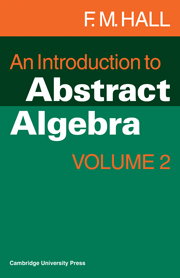Summary
Definition and elementary properties
In the two previous chapters we have discussed rings and fields, the former being structures which admit of addition, subtraction and multiplication, while the latter possess a division process also. We have seen that rings possess comparatively little elementary theory, whereas elementary field theory is of course similar to elementary algebra.
There are some rings, however, which are not fields yet possess many properties that are not shared by all rings. Thus the rings of integers and polynomials over any field possess a great deal of important theory (that concerned with primes and factorisation) that is not applicable to rings in general. There are comparatively few such rings (the integers and polynomials form the main examples) but they are so important that it is worthwhile giving them a distinct name and unifying the theory, rather than dealing with each example separately. (We saw this process at work in volume 1, where much of the polynomial theory in chapter 7 was an exact replica of that for integers in chapter 4.) We are thus led to the idea of an integral domain.
We will see that the theory of factorisation in a ring depends basically on the Cancellation Law of multiplication, that xy = xz ⇒ y = z or x = 0. This is not possessed by all rings (for example the residues modulo a composite number and the rings of functions discussed in chapter 3 do not have the property) but it is a property of the integers and polynomials over a field.
Information
- Type
- Chapter
- Information
- An Introduction to Abstract Algebra , pp. 120 - 147Publisher: Cambridge University PressPrint publication year: 1969
